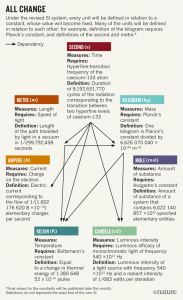The SI units that we know and love today were first published in 1960, but they will be undergoing redefinition in the next few years. But don’t panic just yet!
First, a little history. The International System of Units is the metric system. The abbreviation SI stems from Système international (d’unités) in French. It is based on the metre-kilogram-second (MKS) system of units, in which meters, kilograms, and seconds were the base units.
The SI units are founded on seven base units for seven independent quantities. These units are the meter (m), kilogram (kg), second (s), kelvin (K), mole (mol), ampere (A), and candela (cd). All other units are derived from these seven. For example, the unit of force is a Newton (N), which is equal to 1 m×kg×s-2 in base units.

The SI base units. Depiep: Wikimedia Commons
Metrology is “the science of measurement, embracing both experimental and theoretical determinations at any level of uncertainty”, as defined by the Bureau international des poids et mesures (BIPM).
Changes are made to SI units to ensure stability over the long-term by linking the definitions to invariable constants.
Currently, the kilogram is defined by “the mass of the international prototype of the kilogram”, kept in a vault in Paris. If this sounds vague to you, you’re in agreement with the BIPM and metrologists around the world.
The international prototype of the kilogram is a block of platinum-iridium. However, objects like this one can easily lose or gain atoms or molecules from the surrounding air. In comparison to the prototype, official copies may no longer have the same weight. The prototype has an uncertainty of zero for now, but this is expected to rise.

Official copies of the kilogram are changing. Elizabeth Gibney Nature
SI was designed to be able to evolve as new derivative units are added and old definitions redefined. These changes are discussed at the General Conference on Weights and Measures held by the BIPM. The next conference will be held in Versailles in November 2018.
The latest revision was discussed October 16th-20th 2017 in Paris. In this new system, the base units will be defined in relation to a fundamental physical constant such as the speed of light c or the Planck constant h.

The new, revised SI units. Elizabeth Gibney Nature
These changes won’t affect the way we measure or the measurements we make in our everyday experiments, so we can continue on the way we did before. However, those operating at the absolute highest precision can now rest a little easier.
-May Constabel

2 responses to “SI Units Are Changing, But Will We Have To As Well?”